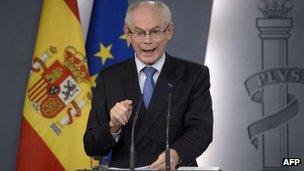Scottish independence: Scots EU independence plan 'now untenable'
- Published

It is claimed Herman Van Rompuy's comments are at odds with those of the Scottish government
Comments by the European Council president have cast further doubt on an independent Scotland's EU membership status, it has been claimed.
Herman Van Rompuy said that, if Catalonia became independent from Spain, previously agreed EU treaties would no longer apply.
Opposition parties said the Scottish government's argument was not tenable.
SNP ministers said the comments were "clearly" about the Spanish situation, which was "very different" to Scotland.
Mr Van Rompuy, who represents the body made up of senior figures from EU member states, made his comments while reacting to the announcement of an independence referendum by the north-eastern Spanish region of Catalonia.
He said: "If a part of the territory of a member state ceases to be a part of that state because that territory becomes a new independent state, treaties will no longer apply to that territory.
"In other words, a new independent state would, by the fact of its independence, become a third country with respect to the Union and the treaties would, from the day of its independence, not apply anymore on its territory."
Reacting to the comments, Scottish Labour external affairs spokeswoman Patricia Ferguson, said: "Alex Salmond's position on an independent Scotland's membership of the European Union is no longer tenable.
"The most senior officials in the European Union are contradicting his assertions yet he just sticks his fingers in his ears and asks people to ignore the facts."
Scottish Conservative leader Ruth Davidson, added: "An independent Scotland wouldn't call the shots in negotiating entry to the EU, nor would it get any special treatment.
"It would join the back of the same queue as every other country."
Scottish Secretary Alistair Carmichael, said: "There is no escaping the fact an independent Scotland would face a difficult journey back into the EU.
"They simply cannot say there is any certainty over where these negotiations would end up or the amount of time they would take."
On 18 September next year, voters in Scotland will be asked the yes/no question: "Should Scotland be an independent country?"
The Scottish government has argued that, in the event of a "Yes" vote, Scotland would remain part of the EU and negotiate its membership terms "from within".
A Scottish government spokesman said of Mr van Rompuy's remarks: "These comments are clearly and explicitly about the situation in Spain and Catalonia - not about Scotland, where the constitutional circumstances are very different, as enshrined in the Edinburgh Agreement.
"It is clear that Scotland can negotiate the specific terms of independent membership of the European Union from within the EU, in the 18-month period between a vote for independence and independence day itself in March 2016.
"That is a position backed by many leading international experts and endorsed by the European Commission in recent correspondence - and it is a timescale described by the UK government's own legal adviser as 'realistic'."
The Catalan government has announced plans for an independence referendum in November 2014, but the Spanish government has said the vote could not go ahead.
- Published12 December 2013